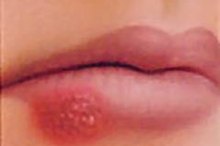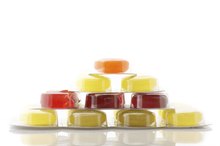How Do I Treat a Canker Sore With Salt?
Canker sores, also called aphthous ulcers, are sores that develop in the soft tissues of the mouth. Although their exact cause is unknown, canker sores can be triggered by trauma, chemical or food sensitivities, infections, stress or certain medical conditions. These sores are not contagious and usually heal on their own. But canker sores can be very painful, particularly when eating, drinking or talking, prompting sufferers to use doctor-recommended treatments and home remedies, such as salt water rinses, to speed healing and reduce pain.
If you are experiencing serious medical symptoms, seek emergency treatment immediately.
Doctor-Recommended Treatments
Treatment of canker sores is directed at managing pain, speeding up the healing process and preventing recurrent sores 2. If the sores are large, painful or keep coming back, your doctor may recommend certain over-the-counter (OTC) or prescription treatments, such as antimicrobial rinses and topical steroids 3. Other helpful OTC products include:
- emollients that coat
- protect the sore from acidic or spicy foods
- numbing agents
- such as benzocaine
- or oral pain relievers
- including ibuprofen or acetaminophen
Severe or recurrent canker sores may require the use of oral steroids or other prescription medications.
Popular Home Remedies
How to Heal Tongue Sores
Learn More
While canker sores are still open and not yet healed, the associated pain and discomfort can be worsened by eating, drinking or talking. Consequently, canker sore sufferers tend to try a variety of approaches, including home remedies, to curb the pain and improve healing. Examples of these natural treatments include:
- supplementation with B vitamins
- zinc
- probiotics
- or the amino acid L-lysine,
- herbal rinses made from chamomile
- echinacea
- myrrh
- licorice or aloe
Homeopathic remedies and rinsing with salt water are also commonly used to treat mouth sores. However, to date there is little research on the effectiveness of these remedies in the treatment of canker sores 2.
- While canker sores are still open and not yet healed, the associated pain and discomfort can be worsened by eating, drinking or talking.
Salt Water Solution
Salt water solutions may be one of the most traditional home remedies for mouth and dental problems -- and they are also commonly believed to speed the healing of canker sores. To prepare, mix a solution of 1 teaspoon salt and 1 cup of water. You may also add 1/2 teaspoon of baking soda to the mixture. Rinse the mouth for about 30 seconds, 3 to 4 times daily, then spit the saline solution into the sink. Although there's no proof this salt rinse is an effective canker sore treatment, there are reasons it may help. Rinsing the mouth with salt water can reduce bacterial counts, reduce inflammation and improve wound healing, according to preliminary research.
- Salt water solutions may be one of the most traditional home remedies for mouth and dental problems -- and they are also commonly believed to speed the healing of canker sores.
Warnings
How to Get Rid of Mouth Ulcers
Learn More
While most canker sores heal on their own, it's important to see a doctor if you have sores that last 2 weeks or more, or if you have very large, painful or recurring sores. Also see your doctor if you have severe pain, difficulty eating or drinking or if you have a fever along with the sore.
Reviewed by Kay Peck, MPH RD
Related Articles
References
- Journal of Pharmaceutical Sciences and Research: Various Remedies for Recurrent Aphthous UlcerA Review
- The American Academy of Oral Medicine: Canker Sores - Treatment
- Merck Manual: Recurrent Aphthous Stomatitis
- Journal of Alternative and Complementary Medicine: Recurrent Aphthous Stomatitis: Do We Know what Patients Are Using to Treat the Ulcers?
- Journal of the American Dental Association: Multivitamin Therapy for Recurrent Aphthous Stomatitis A Randomized, Double-Masked, Placebo-Controlled Trial
- PloS One: Rinsing with Saline Promotes Human Gingival Fibroblast Wound Healing In Vitro
- Edgar, N., Saleh, D., and R. Miller. Recurrent Aphthous Stomatitis: A Review. Journal of Clinical and Aesthetic Dermatology. 2017. 19(3):26-36. PMID: 28360966
- Ziaudeen, S., and R. Ravindran. Assessment of Oxidant-Antioxidant Status and Stress Factor in Recurrent Aphthous Stomatits Patients: Case Control Study. Journal of Clinical and Diagnostic Research. 2017. 11(3):ZC01-ZC04. doi: 10.7860/JCDR/2017/22894.9348
- Weller, Richard P. J. B., Hamish J.A. Hunter, and Margaret W. Mann. Clinical Dermatology. Chichester (West Sussex): John Wiley & Sons Inc., 2015.
- Edgar, N., Saleh, D., and R. Miller. Recurrent Aphthous Stomatitis: A Review. Journal of Clinical and Aesthetic Dermatology. 2017. 19(3):26-36.
Writer Bio
Deanne Lachner has been writing and editing fiction and nonfiction for more than 15 years. She has published articles in "Working Women," "Performance Magazine" and the "Direct Selling News." Lachner holds a master's degree in English from Texas Woman's University and is pursuing a second master's degree in instructional design and technology.








